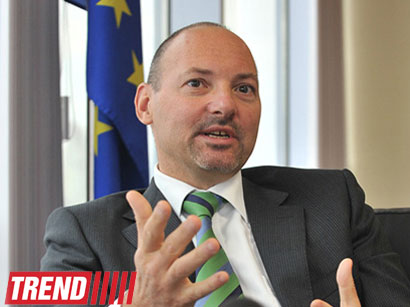Azerbaijan, Baku, June 7 / Trend I. Izzet /
Discussions over the Nagorno-Karabakh conflict settlement must be more transparent, head of the EU delegation to Azerbaijan Roland Kobia said at the 'EU-Azerbaijan: security and integration' conference organised jointly by the Centre for Strategic Studies under the Azerbaijani President and the European Policy Centre today.
The EU supports Azerbaijan's territorial integrity, Kobia said.
He added that the OSCE Minsk Group is dealing with the settlement of the Nagorno-Karabakh conflict and if negotiations are held, other principles must be taken into account.
"There may be different interpretations in the conflict settlement," he said. "Azerbaijan hopes this will solve the problem. The Azerbaijani territories have been occupied and the UN resolutions must be fulfilled. The OSCE Minsk Group is the only format in the Nagorno-Karabakh conflict settlement. There is no other.
"There may be different interpretations. Some people in Azerbaijan think this is not enough. But now there is only this way. If there is another format, then other partners will be invited to this group and we can consider this angle. At present, we try to maintain what already exists. Discussions being held to resolve the problem must be more transparent."
"Of course, Azerbaijan and Armenia will make decisions on the format," he said. "While preserving the existing format, it can be effective. The mediation can be changed. The parties may express their political will differently. Therefore, there is a great benefit to the transparency of the process."
The conflict between the two South Caucasus countries began in 1988 when Armenia made territorial claims against Azerbaijan. Armenian armed forces have occupied 20 per cent of Azerbaijan since 1992, including the Nagorno-Karabakh region and seven surrounding districts.
Azerbaijan and Armenia signed a ceasefire agreement in 1994. The co-chairs of the OSCE Minsk Group - Russia, France and the U.S. - are currently holding peace negotiations.
Armenia has not yet implemented the U.N. Security Council's four resolutions on the liberation of the Nagorno-Karabakh and the surrounding regions.






